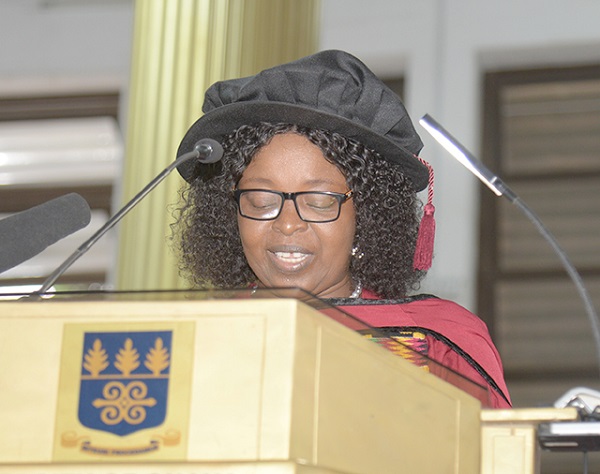
Media must be circumspect on reporting suicide — Prof. Akotia
A renowned social and community psychologist, Professor Charity Sylvia Akotia, has urged the media to be circumspect on how they report on suicide cases.
She said research had shown that the media had a penchant for reporting on suicide, especially involving celebrities, in a manner that could trigger suicide in vulnerable groups such as young people.
Delivering a lecture at the University of Ghana’s 75th Anniversary Inaugural Lecture last Thursday, Prof. Akotia, who is a former Dean of the School of Social Sciences of the University of Ghana (UG), said media reportage on suicide was mostly not in line with the World Health Organisation (WHO) guidelines on reporting on suicide.
Lecture
The lecture was on the topic: “When Life Becomes Unbearable: Dynamics and Complexities of Suicidal Behaviour and Prevention in a Cultural Context”.
The UG 75th Anniversary Inaugural Lecture is a series that hosts notable persons who have distinguished themselves in their respective fields, as part of activities to commemorate the university’s 75th anniversary.
Prof. Akotia’s lecture focused on what constituted suicide (cultural and legal), attitudes towards suicide, motivations for suicidal behaviour, suicide and the law, experiences of survivors and their families, and media perspective on suicide.
The lecture was attended by notable personalities, including a Justice of the Supreme Court, Justice Prof. Henrietta Mensa-Bonsu, and the Vice-Chancellor of UG, Prof. Nana Aba Appiah Amfo, who chaired the function.
Prof. Akotia said the media were a powerful force in society, and as such they had a responsibility to promote education on suicide prevention.
“Clinical and research experiences on working on suicidality in Ghana for close to a decade have shown that most media reports on suicide in Ghana are not guided by any specific guidelines, and if they are, it is possible they are not compliant,” she said.
Per the WHO responsible reporting guidelines on suicide, a media reportage on suicide should include accurate information on where to seek help for someone contemplating suicide and educate the public on the facts of suicide and suicide prevention, without spreading myths.
The guidelines also encourage the media to report on how to cope with life stressors or suicidal thoughts and how to get help.
Again, the WHO encourages the media not to give prominence to suicide stories, not to repeat such stories, not to provide details about the location of the incident and not to use sensational headlines or photographs or video footage.
Prevention
Prof. Akotia said although many cases went unreported, about 1,900 suicide cases were said to occur annually in the country.
She said suicide and suicidal behaviour had a negative toll on families, communities and the nation at large as it did not only lead to loss of lives but also left scars on people.
“Suicidal behaviour may also affect the health and well-being of the suicidal person, as well as significant others, including families and loved ones, friends, co-workers and the community at large,” she said.
On how to improve suicide prevention in the country, Prof. Akotia said there was the need to decriminalise attempted suicide, adding that the attempt to commit suicide was a mental health issue and not a criminal issue.
“This is important as criminalising suicide prevents persons in distress from seeking help, and makes suicidal persons aim to complete the behaviour,” the social and community psychologist said.
Prof. Akotia also called for the establishment of a national suicide prevention centre to help collate information on statistics on suicide, lead awareness on the need not to opt for suicide and also as a reference point for people seeking help.
Prof. Amfo said suicide should never be an option, no matter the situation, adding that “suicide is preventable and should never be an option”.
Writer’s email:
